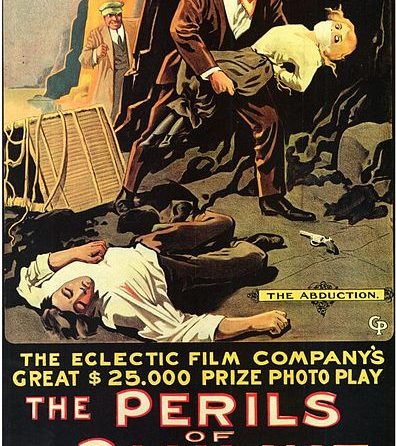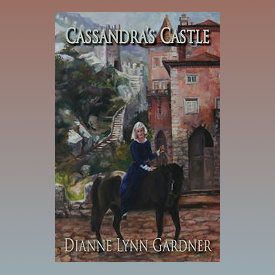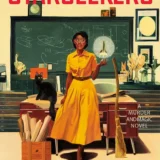If I had a $1 for every time I read online about how publishing is like the lottery, I wouldn’t have to write books any more. I’m not sure where this notion got started, but it is pervasive and, to me, bothersome. Maybe part of it stems from the fact that people are baffled when what appears to be a perfectly “good book” is passed over, while another “bad book” garners huge success. I put those terms in quotations because I’m a firm believer in the subjectivity of books. For me the definitions are pretty simple:
- A “good book” is one I enjoyed and I feel like it was worth both my time and my money
- A “bad book” is any book that I don’t classify as a “good book”
Determining which books are “good” and which are “bad” is extremely easy when you are dealing with an individual. It’s when you try to extend that to a universal classification that things get difficult, and I could write an entire post on that subject, but that’s for another day.
Getting back to the topic at hand. I object to the notion that my (or any author’s) success or failure as a writer is totally beyond my ability to influence. I see it is a cop-out used to absolve writers of their own responsibility. Let’s break it down.
Characteristics of a Lottery
A lottery is 100% governed by statistics and probability. If there are 1,000,000 possible combinations and at least one ticket of each combination has been bought there WILL be a winner. If you are playing a 6 from 49 lotto and you buy 49 tickets each with a unique number in the first position – you WILL match at least one number. There are very few things you can do to change your odds in a lottery:
- Don’t play at all – guaranteeing you can’t win
- Buy multiple tickets – which for those lotteries with at least one winner will increase your chances
- Buy every possible combination – ensuring you’ll be at least one of the winners
When playing the lottery it doesn’t matter where you buy your tickets, how you came up with the numbers, or how frequently certain numbers have occurred in the past. None of these factors will influence the outcome.
What it takes to get published
Becoming successfully published is almost the antithesis of the lottery, which is controlled simply by chance and probability. If ever there was a profession that was subjective in nature, it is publishing. There are almost an incalculable number of variables that come into play:
- What genre you have written in
- What has been recently signed or published
- Your ability to write a good query letter
- The mood of the acquisitions editor or agent on the day they read your query/manuscript
- How compelling your idea is
- How well you executed on your idea
I can hear people reading this article saying, “Okay, so maybe it’s not a lottery, but you must admit that luck is a factor and you have to be lucky to “make it.” To that I say, luck CAN be a factor. There is always the very small probability that you just happen to bump into the right person on the right day with the right idea and everything clicks into place. But this is an outlier situation and no career should be started or built hoping for such serendipity to occur. I’ll actually address the “luck” component a bit toward the end of this article but for now let’s concentrate on what I consider the blueprints for success.
To me success comes down to three important ingredients:
- Talent – which I define as the spark of creativity inherent in all storytellers
- Skill – which is the ability to transform that idea into the written word
- Persistence – which is the driving force that pushes through the disappointments and failures (of which there will be many) and refuses to give up.
Talent
To a large extent, I think talent is something you are born with. My wife is a fabulous editor and we often kid that she is like BASF, “She doesn’t make the books, she makes the books better.” If presented with a novel she can see what works and what doesn’t. She can find the plot holes and make suggestions that improve the book to an amazing degree. But if asked to create something from nothingness, she flounders and just can’t do it.
I, on the other hand, have always been a storyteller. It started as a way to occupy myself when I was bored (which was often). Later I could see that my mind naturally made connections in ways that others didn’t. I have more story ideas then I’ll ever be able to write before I die, and so I’m constantly having to prioritize which I’ll work on next. For me, creating stories isn’t something I can turn off. It just happens.
For those not predisposed in the talent department, it is quite possible that if they have the desire and determination they can develop a certain degree of talent. It may take a very long time, and it may not come easy, but humans are remarkably capable at adaptation. Extensive immersion in reading would certainly help. Also, while I’ve never been in a creative writing program, I’m sure there are techniques that they teach to help people learn how to conceptualize and follow through on an idea. These people may not be as prolific as someone who is a “natural storyteller”and they have to work much harder to produce the same level or result, but given enough determination they will be able to conceive of a marketable idea.
Skill
In many ways, I think this is the easiest of the three attributes. The reason is that, unlike talent, this is almost 100% learned. I think of skill as the ability to take the idea and convey it in a way that entertains, moves, enchants, or in any other way affects the reader. The most important aspect to honing this ability is exposure and practice. The more you read and the more you write, the more skilled you will become. Assuming, of course, you’re working toward constant improvement.
Stephen King says the first 1,000,000 should be considered “practice,” and Malcolm Gladwell puts forth the idea that it takes 10,000 hours doing a particular task to become an expert. Of course, this assumes you’re not just repeating the same mistakes that you made at sentence one, hour one, and are working at recognizing what works and what doesn’t and constantly adjusting to produce a better result.
If we once again put outliers aside, you’ll find that most successful authors had many failed attempts before they produced something that was “publishable.” I myself had ten novels I considered “practice” (ones I had no intention on publishing) but were merely teaching myself how to write by going through the process. After that, I had two more novels that were of publishable quality, but neither of those ever made it “out there.” Yes, for me it was lucky number thirteen (pun intended) that finally got into the public, and it took me over a decade of concentrated work on “the skill” of writing to get to the stage where I could routinely produce work that was of sufficient quality.
Persistence
This is the place where I feel most authors falter and fall. I get a lot of flack when I say things like, “Maybe you just didn’t want it enough.” Or “Maybe you didn’t work hard enough.” But I say these things because sometimes a person needs tough love and a kick in the pants to drive them to make yet another attempt.
Look, I totally understand the frustration and the thoughts of utter futility that is an integral part of the “publishing game.” I myself felt like Linus in the pumpkin patch waiting for The Great Pumpkin and then finally realizing I was dubbed. I wrote for over a decade, completed twelve novels, which consisted of many more than 1,000,000 words, and spent well in excess of 10,000 hours. Still, after all that I had nothing to show for my efforts except a pile of rejection letters.
I quit writing and in a very dramatic “I’ll never write creatively again” way. And I was able to resist the temptation for more than a decade. I poured my creative pursuits into graphic design and building an advertising agency. Yes, the story ideas still came to me, but I didn’t even write them down in notebooks. Characters whispered to me, and I pushed them away. Those are ten years I’ll never get back, and as I already mentioned I have more stories to tell then my remaining lifespan can support, so there will be many, many books lost forever. While I try not to have regrets, it’s hard not to recognize the folly of my decision to quit writing.
If we return for a moment to our lottery analogy than persistence is the component that you can use to move the odds in your favor. If you write just a single book, it is easy for it to fall through the cracks, but if you then write another, and another, then each one represents one more time at bat, another chance to connect with the ball.
Luck
I’m sure that many people define luck in a variety of ways. In most, it has a component of randomness or unpredictability. The path of a tornado that leaves one house standing while another is destroyed might be looked upon as “luck” both good and bad. If success in publishing was predicated on such unpredictability then it really wouldn’t matter what you wrote. A book repeating the same word 100,000 times would be just as likely to be picked as one with a compelling story and characters, and no one would take the luck argument to such an extreme.
In regards to publishing, I think a reasonable way to look at it as “being in the right place at the right time.” In other words finding that agent/publisher who is looking for your type of work exactly when you are shopping it around. But that in and of itself doesn’t quite fit the bill. If you have a poorly conceived and poorly written manuscript on EXACTLY the topic at precisely the right time, the result is a pass. You fail not because of bad luck, but because of a failure on your part to produce sufficient quality. You often hear tales about how many times manuscript A or B was rejected before being accepted. But this isn’t so much an indication of “luck” as it is an example of the subjective nature of publishing, or in some cases just poor decision-making by a gatekeeper. The truth is the majority of rejections don’t come as a result of “bad luck” they are the result of “poor execution” or an “unmarketable idea.”
Yes, marketing. That dirty word that most authors don’t want to concern themselves with, but the fact is marketing is a business and business has to concern itself with whether something will sell or not. If you are writing a book that will appeal to only a very small segment of the population, you have reduced your chances significantly This is a fact, not some judgement on the state of literature in today’s society. Now, I’m not saying that you should only write what’s “hot” or “popular.” I think that the best works are produced by people who are writing what they WANT to write and not what they think will SELL. But you have to realize the very real possibility that there may be no market for your beloved work and be fine with that. There’s absolutely nothing wrong with producing something that you are proud of and having its creation being its only reward.
So now we are down to the fact that you have written a well conceived and skillfully produced work that will appeal to a significant number of readers. Congratulations. This is no small feat. At this point you have something that probably only .05% of those desiring to become a writer can do…and such a book CAN be a success. It is a seed that holds the potential to germinate and grow, and that is a very marketable commodity. This is where persistence really comes into play. While there is still a great deal of obstacles that lie in the path of this book’s success there is only one REAL potential for its failure, and that is if you give up trying.
Such a book should never be considered “dead.” No matter how many rejections have been received. Maybe it is the pitch that is wrong, or maybe you need to go to a writing conference or convention and pitch its merits in person so your enthusiasm for the project shines. It may even mean that you’ll have to write another book, and only after that one is accepted and published that you can dust off and resurrect that one. It could be that it just wasn’t “the right time” for that book, and submitting a year later it will be looked upon in a different light. The good news is the hard part has already been accomplished. As I said, only a very small percentage of the books ever make it to this stage. The trick of course is recognizing whether it really is “ready for prime time” and again a subject or another time and place.
What bothers me most about any discussions of luck or lottery, is that it implies I’m powerless to shape my own future. If I thought for one moment this were true, I wouldn’t be in this business…and I have to question anyone who believes this way at the intelligence of their decision. After all if it is only about luck, why bother concerning yourself with skill or talent or even persistence for that matter. After all if it truly were just luck then either you have “bad luck” and no matter what you do will make a difference (in which case don’t even try) or you have “good luck” in which case any string of words you put out there will be signed so there is no reason to focus on anything as meaningless as quality.
When I think about publishing, luck, and success my favorite quote that comes to me is from Thomas Jefferson, who said, “I’m a great believer in luck, and I find the harder I work, the more luck I have.” I think this is Thomas’s way of a saying we make our own luck. If you look at the vast majority of authors who are making a living in this business what you can say about all of them is that they work hard and produce works that people genuinely enjoy. I’m not sure why this seems to be such a hard concept to believe in.
Michael J. Sullivan is a speculative fiction writer who has written twenty-five novels and released nine. Eight of his fantasy books (The Riyria Revelations, and The Riyria Chronicles), were published by Hachette Book Group’s Orbit imprint. Hollow World, a science-fiction thriller was released by Tachyon Publications. The first four books of his new series, The First Empire, has sold to Random House’s Del Rey imprint, and the first book is scheduled to be released in the summer of 2016. He can be found on twitter, through his blog www.riyria.com, and on his facebook page and his publisher’s page for the series.









@Frank – I love the analogy between reading (food) and writing (exercise). And I do agree 100%. For me I put the ‘reading” into the “creative” side and this article was primarily concerned with the “business” side, but it is a valid point and one that deserves to be called out. Thanks!
@Benjamin – I’m glad you enjoyed.
Agreed, 100%. From my own experience (more with art than with writing, though I’ve had three stories pub’d) is that persistence is the key. A lot of wannabes don’t know this, and don’t want to hear this.
The other factor – which you mention briefly – that doesn’t get enough limelight is reading. A lot. I think it was Emerson who said that most young writers give their brains too much exercise (writing) and not enough food (reading). If you’re trying to figure out how to elicit an emotion or structure a story or snag a reader in the first paragraph, chances are that someone has figured it out before. Before I let myself sit down and write my last (published) story, I read (or re-read) 100 stories, and that taught me a lot.
I agree. Regards.